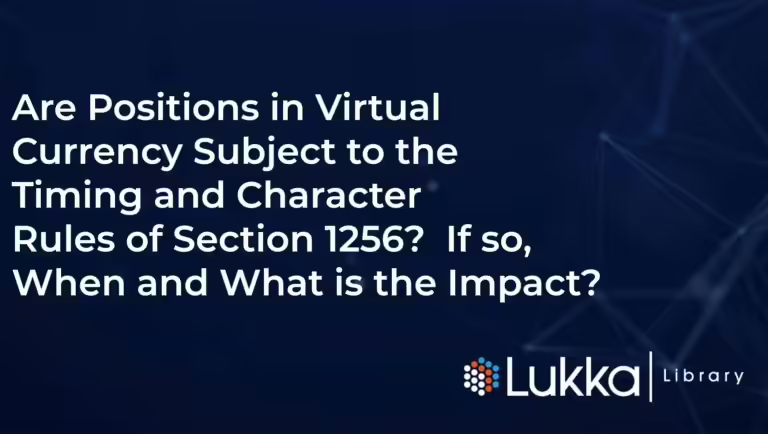Author: Nicholas C. Mowbray a tax attorney, BakerHostetler.1
This communication does not constitute legal advice or an opinion of BakerHostetler. The views expressed in this article are those of the author.
The differences between holding a virtual currency position and a 1256 contract are significant. The former is subject to tax when it is sold or exchanged, with the gains and losses constituting either long-term capital gains, short-term capital gains or ordinary income.2 The latter are subject to (amongst other items discussed below) a mark-to-market method of accounting, thus taking into income as a gain or loss the amount that would otherwise be recognized if the 1256 contract were sold for its fair market value on the last business day of the taxable year.
The U.S. federal income tax rules define five types of financial products as “Section 1256 Contracts.” Currently, however, only Bitcoin futures and options contracts constitute Section 1256 Contracts, and thus only two of these five products are applicable to virtual currencies.3 Nevertheless, the Commodities Futures Trading Commission (“CFTC”) has indicated that other virtual currencies (in particular, Ethereum) may constitute commodities and, in addition, that the CFTC anticipates that additional virtual currency derivatives will be traded on the U.S. markets in the near future.4 Thus, while currently limited, the rules discussed herein will become more applicable as the offering of derivatives for virtual currencies expands. The remainder of this article discusses the special U.S. federal income tax rules that apply to Section 1256 Contracts.
Definition of a Section 1256 Contract
The five products that constitute Section 1256 Contracts include: 1) regulated futures contracts, 2) nonequity options, 3) dealer equity options, 4) dealer securities futures contracts, and 5) foreign currency contracts.5
Regulated Futures Contracts and Nonequity Options
A regulated futures contract is a contract traded on a qualified board or exchange that is marked to market on a daily basis to determine the amount the taxpayer must deposit to its margin account to cover losses, or the amount that it may withdraw from that account as a result of gains.6 A non-equity option is an option (other than an “equity” option) that is traded on or subject to the rules of a “qualified board or exchange.”7
A qualified board or exchange includes: a) a national securities exchange registered with the Securities Exchange Commission (“SEC”); b) a domestic board of trade designated as a contract market by the CFTC; or c) any other exchange, board of trade, or other market that the IRS determines has rules adequate to carry out the purposes of Section 1256.8 Thus, while the definitions of a regulated futures contract and a nonequity option differ significantly, they both require establishing that the product is traded on a qualified board or exchange, which should generally be met for trading on a domestic security exchange or commodities exchange, and may be met by a non-domestic exchange identified by an IRS publication.9
Special Treatment Under Section 1256
The rules applicable to Section 1256 Contracts are not elective. Thus, with limited exceptions, a Section 1256 Contract is subject to: 1) a mark-to-market regime (which overrides a taxpayer’s ordinary method of tax accounting); and 2) a 60/40 long-term/short-term capital gain/loss split.
Mark-to-Market Rul
As noted above, the mark-to-market rule requires the holder of a Section 1256 Contract to take into income as a gain or loss the amount that would otherwise be recognized if the 1256 contract were sold for its fair market value on the last business day of its taxable year. If a Section 1256 Contract is closed out or disposed of before year-end, the close-out price is used to determine the amount of gain or loss.10
A taxpayer that reports a mark-to-market gain or loss on a Section 1256 Contract accordingly adjusts its basis in the Section 1256 Contract based on the amount of gain or loss realized from the mark.11 Thus, a taxpayer holding a Section 1256 Contract may suffer the burden of having a year-end tax liability despite not having disposed of and received cash for a position. In addition, a taxpayer may suffer a loss on a disposition in a later year despite receiving cash from the disposition.
60/40 Treatment
60/40 treatment refers to the character of income a taxpayer recognizes from buying and selling Section 1256 Contracts, that is 60 percent of the gain/loss is long-term, and 40 percent of the gain/loss is short-term.12 The rule applies regardless of a taxpayer’s holding period.
Exceptions to Section 1256
As noted above, the special treatment applicable to Section 1256 Contracts is not elective. Nevertheless, there are exceptions to this treatment where, for instance: 1) the taxpayer holds a Section 1256 Contract and an offsetting position in an actively traded personal property (that is, a straddle);13 and 2) a taxpayer elects to be a commodities dealer. The former of these may impact the ability of a taxpayer to defer gains and accelerate losses, while the latter impacts a taxpayer’s ability to claim 60/40 capital gains treatment.
Conclusion
Absent qualifying as a Section 1256 Contract, a virtual currency is not subject to these rules. Taxpayers trading in derivatives of virtual currencies, however, should keep the rules noted above in mind, and carefully analyze them as the number of derivative products applicable to virtual currencies continues to increase.
1 © Baker & Hostetler LLP. Nicholas C. Mowbray is a tax attorney at the law firm of BakerHostetler. This communication may be considered advertising under the rules regulating the legal profession.
2 See BakerHostetler’s Memorandum on the tax significance of distinguishing between a dealer, trader, or investor in virtual currency
3 The Chicago Mercantile Exchange (“CME”) announced in early 2020 that it would launch options on Bitcoin futures. https://www.cmegroup.com/cme-group-futures-exchange/options-bitcoin-futures.html
4 https://www.cftc.gov/PressRoom/PressReleases/8051-19
5 I.R.C. § 1256(b)(1). This article does not define dealer equity options, dealer securities future contracts, and foreign currency contracts as they are not currently applicable to virtual currencies.
6 I.R.C. § 1256(g)(1).
7I.R.C. § 1256(g)(3).
8 I.R.C. § 1256(g)(7).
9 This is because these exchanges are either regulated by the SEC or CFTC. If a product is traded on a non-domestic exchange, the list of exchanges published by the IRS should be reviewed to determine whether they satisfy the definition of a qualified board or exchange.
10 I.R.C. § 1256(c)(1).
11 I.R.C. § 1256(a)(2).
12 I.R.C. § 1256(a)(3).
13 I.R.C. § 1256(a)(4).
This communication does not constitute legal advice or an opinion of BakerHostetler. The views expressed in this article are those of the author.



